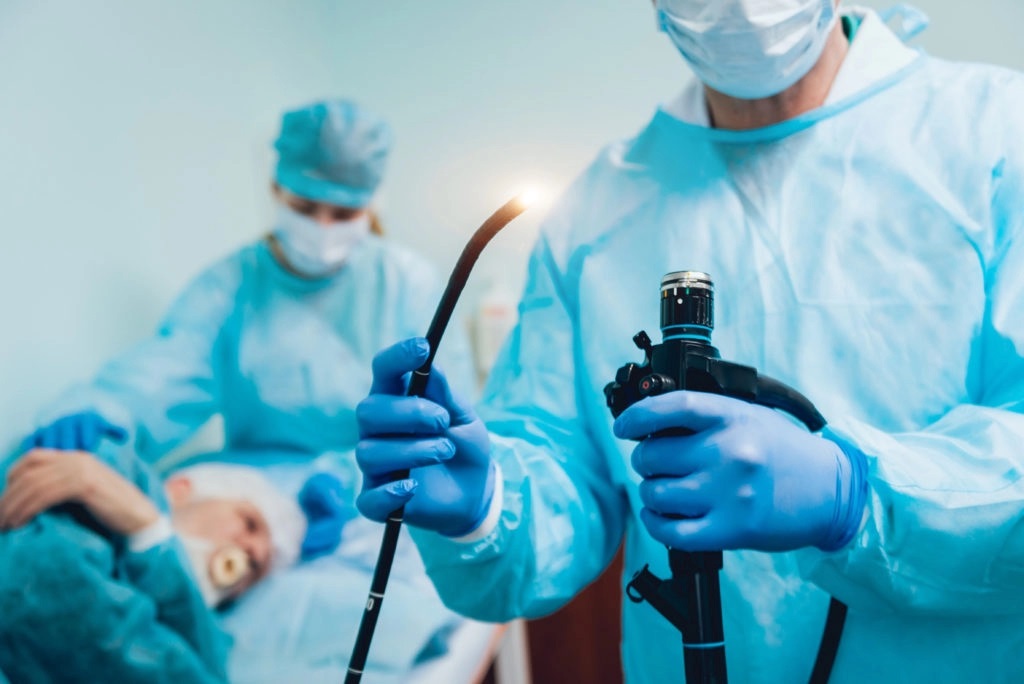Endoscopy
 Many people do not know what an endoscopy procedure is actually about. It is a set of diagnostic techniques during which a special extended probe with a camera, LEDs and a manipulator is inserted through artificial or natural openings of the human body. These manipulations allow the internal walls of the hollow organs of various vital systems such as the digestive, respiratory, urinary and genital ones to be examined. Before this type of procedure, special preparation is required in order to increase its informative value. However, in cases of emergency (e.g. when the patient is in a very critical condition), it is not carried out.
Many people do not know what an endoscopy procedure is actually about. It is a set of diagnostic techniques during which a special extended probe with a camera, LEDs and a manipulator is inserted through artificial or natural openings of the human body. These manipulations allow the internal walls of the hollow organs of various vital systems such as the digestive, respiratory, urinary and genital ones to be examined. Before this type of procedure, special preparation is required in order to increase its informative value. However, in cases of emergency (e.g. when the patient is in a very critical condition), it is not carried out.
Indication
Gastrointestinal endoscopy is carried out in the following cases:
- uspicion of peptic ulcer disease of the stomach and duodenum;
- duodenogastric reflux;
- inflammatory processes in the mucous membranes of the organs;
- suspicion of a benign or malignant tumour;
- GERD (gastroesophageal reflux disease);
- gastric bleeding;
- dilation of the veins of the oesophagus in its lower part.
Bronchoscopy is indicated in the following cases:
- suspicion of a foreign object inside the organ;
- suspicion of bronchial cancer;
- cough with blood without being able to identify the cause;
- congenital organ abnormalities.
A cystoscopy is recommended for urinary incontinence, chronic cystitis, blood in the urine, and suspicion of a tumour in the urinary system.
A colonoscopy is performed if there is suspicion of chronic inflammation of the intestine, or if there is a neoplasm or bleeding.
An ENT or nasopharyngeal and nasal endoscopy is conducted for breathing problems, regular nosebleeds, impaired sense of smell and runny nose. Inflammatory processes in the area, migraines and snoring are also indications.
Contraindications
However it is not always possible to carry out an endoscopy in a clinic. Contraindications include ischaemic stroke, heart attack, radiation damage, mental health problems, shock, heart failure, arrhythmia, active seizure syndrome and clotting problems. Pregnancy is not a contraindication.
Appointment
You can make an appointment to see any specialist at JSC "Medicina" (Academician Roytberg Clinic) on the website. Its interactive form allows you to select a doctor by specialty or search for any employee of any department by name and surname. Each doctor's schedule contains information about our opening days and hours available to patients.
The clinic's administrators are ready to make an appointment or a house call at +7 (495) 775-73-60.
Our convenient location in the Central Administrative District of Moscow (CAD) - the 2-nd Tverskoy-Yamskoy Lane, 10 - allows you to quickly get to the clinic from different underground stations "Mayakovskaya", "Novoslobodskaya", "Tverskaya", "Chekhovskaya" and "Belorusskaya".
Our doctors

General information. Why is this type of diagnosis needed? What does it reveal?
During an endoscopy, the doctor examines openings, cavities and mucous membranes of hollow organs, which further facilitates the diagnostic process.
The main advantage of endoscopy of the nasopharynx, nose, stomach, intestines and other organs is that it makes it possible to quickly find diseases that are not visible in their early stages. Moreover, if you do an endoscopy, they will be detected even before the changes are visible on X-rays. This greatly increases the chances of a positive treatment outcome.
Main advantages
The advantages of endoscopy include the fact that the procedure is minimally invasive, so the recovery period will be very short.
It should also be taken into account that modern endoscopes have not only a camera to visualise all pathological areas, but also auxiliary equipment to collect biological material (mucosal fragments). It is also possible to attach other tools for complex activities. Endoscopy is carried out with various additional manipulations. For example, the doctor may remove a small neoplasm and inject medicine into the required area.
Endoscopy process
Nasal endoscopy, like other types of this procedure, is carried out in more or less the same way. During this method of examination, special equipment is used which is suitable for a particular organ. In general, the principles of carrying out the diagnosis are similar. Their equipment has certain similarities in structure too. It has such details as:
- control handle and valves, which are located on the body;
- eyepiece for visual inspection;
- a flexible rubber tube;
- lighting equipment;
- manipulator.
Modern endoscopes display the image immediately on a monitor.
There are many different types of endoscopic examinations:
- gastroscopy - checking of the oesophagus, stomach and duodenum;
- bronchoscopy - examination of the larynx, trachea and bronchi;
- colonoscopy - required to diagnose diseases of the large intestine;
- nasal endoscopy - nasal and nasopharyngeal examinations;
- hysteroscopy and colposcopy - carried out for the uterine and vaginal cavity;
- cystoscopy - an examination of the urinary tract.
A separate place is taken by capsule endoscopy, the prices of which are quite high. It is an innovative examination method that is highly informative, but non-invasive. It is used to check the condition of the small and large intestine.
Preparation
Preparation for endoscopy does not require much effort or time. It is usually necessary to start a few days in advance. Before the procedure, the patient usually takes laboratory tests. As a rule, local anaesthesia is used during the examination, but sometimes general anaesthesia is also used. No smoking the day before the procedure.
No special diet is required. It is only necessary to restrict your diet the evening before the endoscopy examination. It is allowed to drink a little water, but it is better to check this with your doctor, as it depends on the type of endoscopy examination.




